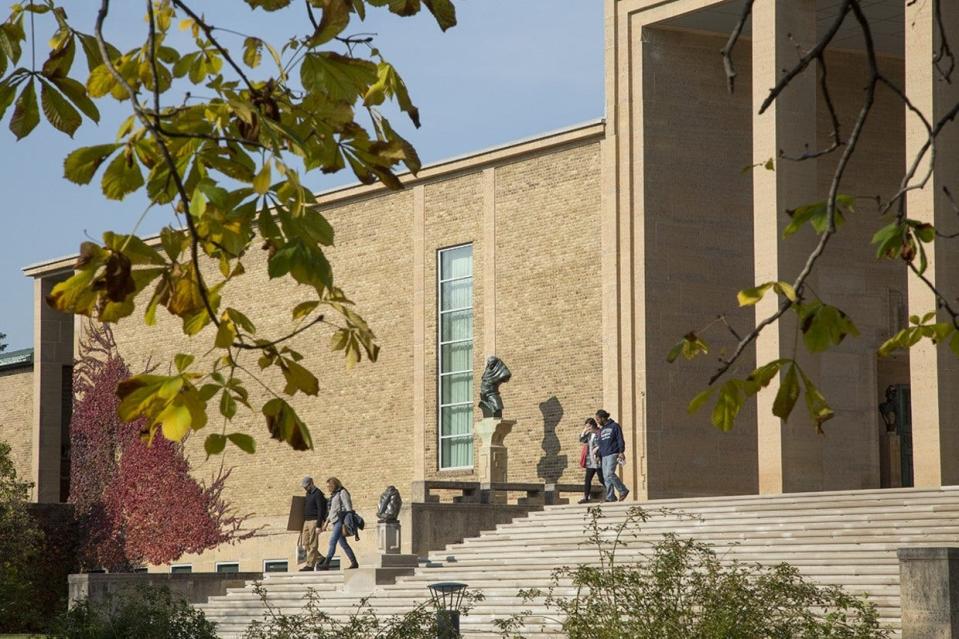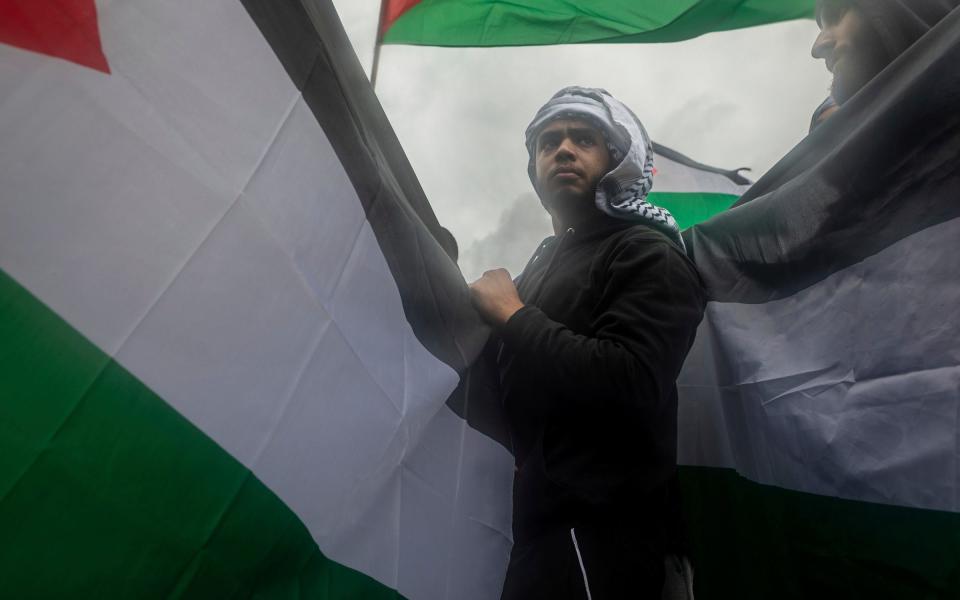Cranbrook school removes students' Palestinian flags, stirring protests and debate
As the death toll in Gaza rose, dozens of students at the Cranbrook Academy of Art in Bloomfield Hills decided last month to put up Palestinian flags in their studio windows to express solidarity with the victims.
But administrators at the prestigious art school determined they were offensive and could be triggering to some, especially to younger students at a nearby K-12 Cranbrook private school. Cranbrook officials told the students in a Nov. 4 email signed by the school director and president to remove the flags. Shortly after the email was sent, security working for Cranbrook went into the personal art studios of the students and tore down all the Palestinian flags, according to students.
Ceasefire updates: 13 Israelis among about 2 dozen hostages released by Hamas
The move outraged the student artists, prompting a letter signed by more than half of the school's roughly 120 students and about 200 alumni. It has prompted a debate that has roiled the Cranbrook community, similar to other clashes taking place across Michigan over the past seven weeks amid the Israel-Gaza war. Arab American advocates have expressed concern about Palestinian symbols being demonized while Jewish communities have expressed fears about feeling unsafe when seeing certain flags or displays.

"We are unsettled by the administration’s decision to deploy security to abruptly remove Palestinian flags from the windows of our personal studios on the evening of Saturday 11/4," read the letter jointly written by students. "Taking an executive decision towards forcibly ridding our windows of Palestinian flags sets a reprehensible precedent ... Sending Academy personnel to walk through our hallways, our spaces, our homes for the duration of our degree is an infringement on the very safety the Academy is ostensibly trying to ensure through this act of censorship."
After the flags were removed, some of the students put up in their studio windows illustrations of watermelons, a symbol of Palestinians because the colors — red, black and green — are the same that make up the Palestinian flag.
The academy is part of several institutions that make up what is called the Cranbrook Educational Community, a sprawling campus in Bloomfield Hills founded by the late newspaper publisher George Gough Booth that includes schools, an art museum, science institute and gardens. Christ Church Cranbrook, which used to be part of the community but separated decades ago, sits nearby.
A few days after the flags were yanked down, school director Paul Sacaridiz resigned from his position and then on Nov. 11, several students who opposed the removal of the flags boycotted an annual open house held for prospective students, Vijay Iyer, a spokesman for the school and Cranbrook Educational Community, told the Free Press. Last week, Cranbrook's art school and its museum "chose to postpone select shared events so the Academy can focus on our internal dialogue," Iyer added. In two statements, Aimeclaire Roche, president of the Cranbrook Educational Community, which the school is part of, defended the removal of the flags and slammed the letter and petition signed by students. Sacaridiz could not be reached for comment.
"The petition that has recently been circulated within the Cranbrook Academy of Art community by certain students and alumni in no way reflects the views and values of Cranbrook nor does it speak for the institution," Roche said in a Nov. 10 statement. "Let me be clear: we denounce — in the strongest terms possible — all forms of antisemitic, Islamophobic, racist, and hate-based discrimination and they have no place on our campus."
The debate at Cranbrook has been echoed across Michigan and the U.S. since the latest Israel-Hamas armed conflict started Oct. 7. Palestinian advocates and Arab American civil rights leaders say there is a pattern of Palestinian symbols — their flag, a scarf sometimes known as kaffiyeh, and chants at rallies — being falsely labeled as being hateful and extremist. In one recent case, an employee at a hospital who wore a kaffiyeh to work was reprimanded, told that his scarf is like wearing a Confederate flag and made people uncomfortable, said Abed Ayoub, a Dearborn native who is executive director of the American-Arab Anti-Discrimination Committee. Ayoub did not specify which hospital was involved.

"This is another example of a brazen attempt to silence and erase Palestinians in the workplace," Ayoub said via X.
There have also been growing attacks on some of the chants heard at pro-Palestinian rallies, such as "From the river to the sea, Palestine will be free." Fox News has aired reports that attacked pro-Palestinian protests held by high school students in Dearborn and Dearborn Heights; the TV reports were criticized by Dearborn's city council and Dearborn Heights Mayor Bill Bazzi for being inaccurate and inflammatory.
'It's horrific': Michigan families mourn relatives killed in Gaza
Pro-Israel advocates applaud Cranbrook for its decision, saying there is an alarming increase in antisemitism over the past month. Both sides feel they are being unfairly marginalized.
"Our schools need to be especially safe spaces for students," Rabbi Asher Lopatin, executive director of a metro Detroit group, the Jewish Community Relations Council/American Jewish Committee. "Therefore, many times, the kind of speech we would allow in the public sphere should not be allowed in schools because they will intimidate other students."
Lopatin said putting up certain Palestinian symbols would be like if students put up a sign that read: "We love the IDF," the Israeli military known as the Israel Defense Forces.
"I would ask the students that were involved in putting up these signs, which were offensive, what would they think if other students put up signs that said 'We love the IDF?' " he asked. "For people who care about Israel, the IDF, the Israel Defense Forces, are the brave soldiers and personnel who defend the Jewish state from those who would try to wipe it out and destroy it. However, to other students — whose Palestinian or Arab relatives might have even had negative encounters with the IDF — this might be offensive. So, those students who would be offended by a 'we love the IDF' poster should understand how a poster of a Palestinian flag, or something like that, would be offensive to Jewish students or students who love and care about Israel.
Last month, on Oct. 9, a student at Wayne State University who is Jewish said he was shoved and called an "(expletive) Zionist" while painting a free speech rock with an Israeli flag, according to the Anti-Defamation League.
On Tuesday, state Rep. Noah Arbit, D-West Bloomfield, founder of the Michigan Democratic Jewish Caucus, released a public service announcement denouncing antisemitism on campuses and offering a hotline for people to call to report incidents.
"I feel a responsibility to speak out and stand with our Jewish students who feel unsafe in the wake of Oct. 7," Arbit said. "To our Jewish students, I know what it’s like to feel unsafe on campus because of your Jewishness."
Michigan synagogue: Tears flow as mourners call for Hamas to release Israeli hostages
The students who signed the letter say that the Palestinian side is the just one.
"Supporting marginalized communities and standing in solidarity with liberation movements are fundamental to our rights to speech, expression, and creativity," the letter protesting Cranbrook read. "The current stance taken by the Academy infringes on these rights, which are pivotal to academic freedom and resonate deeply with the broader global community. This campus is home to Black, Indigenous, and Brown students, people from the global South, diasporic students, and queer students whose liberation and freedom is contingent on decolonial struggle."
Students at Cranbrook are not allowed to speak to the news media, according to their handbook. A student at Cranbrook spoke with the Free Press about the events in recent weeks and shared their concerns, which include fears about art collectors and galleries shunning their work in the future if they voice support for Palestinians.
Outside of campuses, protests also continue to take place in Dearborn, Detroit, West Bloomfield and other cities, with more planned in coming days. The number of protests in Michigan since Oct. 7 are believed to be the most regarding a Palestinian-Israeli conflict in at least the past quarter-century. On Thursday, pro-Palestinian protesters demonstrated at the Thanksgiving Day parade in Detroit, chanting "free, free Palestine" as they joined the procession a couple of blocks behind the parade with a banner that read "Detroit Stands with Gaza." And last week, protesters demonstrated at the Christmas tree lighting at Campus Martius, calling for a cease-fire and unfurling a Palestinian flag.
Iyer said Cranbrook does "not take a position on political causes, conflicts, or events. Our practice is to keep the common, shared areas of our campus free of messaging or activities, as displays of this nature could be interpreted as political statements made on behalf of Cranbrook. We take this approach because Cranbrook is a pluralistic and unique community, one that values and welcomes a variety of audiences."
Contact Niraj Warikoo: nwarikoo@freepress.com, X @nwarikoo, Facebook.com/nwarikoo.
This article originally appeared on Detroit Free Press: Cranbrook Academy removes Palestinian flags from student studios

